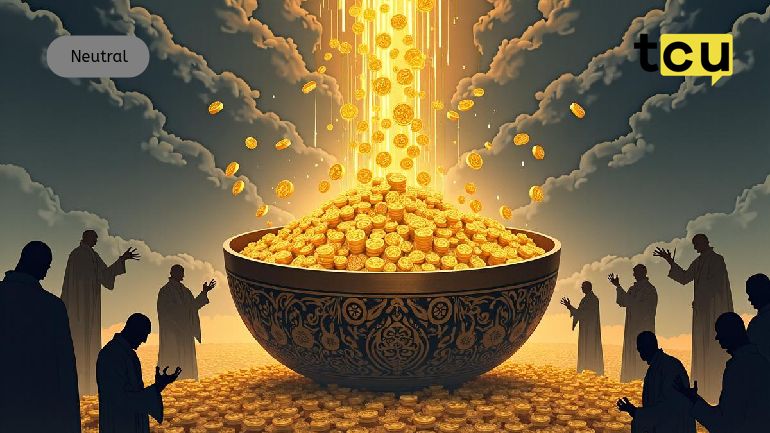The Trump family disrupts the crypto world: what was thought to be a "return to the source" has instead become mired in a quagmire
The actions of the Trump family in the cryptocurrency field have sparked controversy.
Original Title: "Crypto's First Family Is Deepening the Swamp"
Author: Lionel Laurent , Bloomberg Opinion Columnist
Translation by: J1N, Techub News

U.S. President Donald Trump's second son, Eric Trump, believes now is a good time to buy Ethereum, as he thinks his support for Ethereum has driven a brief rise in its price. However, at the same time, it is also a good time for politicians and regulators to take action to establish stricter regulatory measures targeting the cryptocurrency business that the Trump family and its associates are actively promoting, which is rapidly expanding and has serious conflicts of interest with regulators.
It is now clear that the Trump family not only wants to pave the way for the U.S. to support cryptocurrency through more favorable regulations, but they also want to get a piece of the pie. The decentralized finance platform World Liberty Financial, supported by the Trump family, has established a cryptocurrency reserve that includes approximately $340 million worth of Ethereum. According to Reuters, Trump has issued billions of Memecoins out of thin air, generating nearly $100 million in transaction fees for presidential-related entities. Additionally, Trump's Truth Social platform is also expanding its business and plans to enter the financial services sector.
This is not the kind of small-time investment typical of an ordinary family; based on current spot prices, the Memecoins held by entities connected to Trump have a book value of about $14.9 billion. If these numbers are astonishing, the risks are equally staggering. As investors and industry insiders seek to curry favor with the Trump team by purchasing its tokens, it ultimately leads to an escalation of power transfer and corruption. At the same time, it also brings moral hazards, as the world's most powerful individuals and their relatives promote Memecoins and can afford the risks, leading more people to invest in Memecoins without understanding their risk tolerance. When someone tells Trump how much his Memecoins are worth, he almost indifferently responds, "Billions of dollars? That's just pocket change."
Therefore, when Eric Trump casually suggests on Twitter that "Ethereum is worth buying," he is not just speaking idly, as he seems to have realized when he deleted the phrase "You can thank me later" on X. Whether by coincidence or design, World Liberty has put his thoughts into practice; after Trump's tariff threats triggered a sell-off over the weekend, the project address increased its holdings of Ethereum by about $55 million. This was done after the platform transferred most of its reserves to Coinbase, although they deny having any plans to sell. At this stage, the conspiracy theory that the Trump team is harvesting the market through cryptocurrency is unfounded; after all, Trump's tariff policies are not favorable to cryptocurrency, and his son's tweets have a very limited overall impact on the market. However, given that this is the third week of the new administration, the atmosphere of a "banana republic" is already quite thick.
(When people say a country is like a "banana republic," they are criticizing the country for having serious political chaos and corruption issues.)
Democratic nations have existed long enough to establish institutional safeguards to prevent political conflicts of interest. But the question is whether the authorities have the determination to truly enforce these measures. The U.S. pushed for reforms in official ethics and transparency after the Watergate scandal, enacted the 2012 STOCK Act to combat insider trading, and has had the Foreign Emoluments Clause since the Constitution. Cryptocurrency cannot be an excuse to evade regulation: the EU's latest digital asset rules explicitly include provisions against insider trading and market abuse. Moreover, Tulsi Gabbard, a former Democratic congresswoman nominated by Trump, has agreed to sell her stocks and cryptocurrencies to comply with relevant regulations.
If the authorities do not effectively enforce and strengthen measures, then the regulation of behavior will be meaningless. Trump seems unconcerned about this. Howard Lutnick, Trump's nominee for Secretary of Commerce, did not clarify whether he would avoid participating in the cryptocurrency working group due to his company Cantor Fitzgerald holding convertible bonds related to the stablecoin Tether. There are issues of self-dealing within institutions that could lead to economic losses in the future; for example, when the German fintech company Wirecard AG collapsed, its regulator BaFin's staff were suspected of insider trading Wirecard's stock instead of fulfilling their supervisory responsibilities. We hope that David Sacks, the cryptocurrency chief appointed by Trump, will truly fulfill his promise to strengthen consumer protection.
At the very least, a basic requirement for all politicians is that they must place all their investments into "blind trusts" on the day they take office, while also imposing restrictions on their relatives' investments. Here, "blind trusts" refer to a form of asset management where politicians hand over their assets to a third party for management, thereby avoiding any influence on investment operations to prevent officials from using their power for personal gain. This is a viewpoint proposed by Garen Markarian, a corporate governance expert at the University of Lausanne. It is concerning that the prevailing attitude among the elite is to advocate for reduced oversight rather than increased scrutiny of politicians and their related investments.
Trump is teaming up with the cryptocurrency circle to vehemently criticize the so-called "de-banking" phenomenon; meanwhile, Musk is allowed to set his own rules, using DOGE as a weapon against the government. This is a classic case of overconfidence, especially considering that this president was once convicted of fraud. It also sends a signal of arrogance to the general public, showing that the privileged class with insider information is treated more leniently by the law. The regulatory chaos in the cryptocurrency field is glaringly obvious, but there are few signs of action to clean up this mess.
Disclaimer: The content of this article solely reflects the author's opinion and does not represent the platform in any capacity. This article is not intended to serve as a reference for making investment decisions.
You may also like
US and Canada crack down on $4,3 million Ethereum phishing scam
ENS Founder Flags “Highly Sophisticated” Google-Based Phishing Scam
A new phishing campaign is alarming cybersecurity experts because it exploits Google’s trusted infrastructure.


OM Mantra Cryptocurrency Crashes Amid Accusations of Team’s Market Manipulation and Token Dumping

